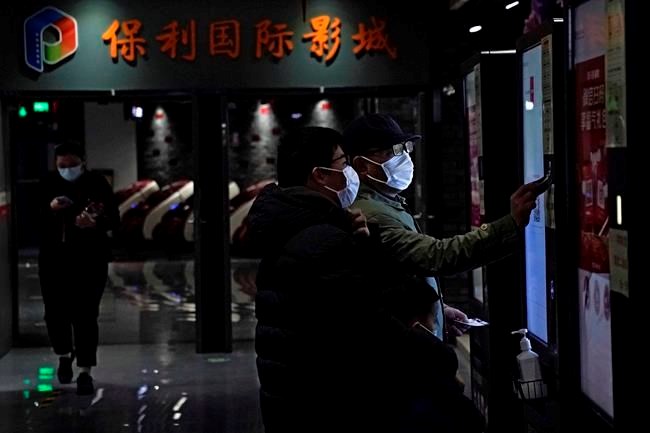BEIJING — The thrills and chills of the big screen are back big-time in the world’s largest film market.
With the coronavirus well under control in China and cinemas running at half capacity, moviegoers are smashing China's box office records, with domestic productions far outpacing their Hollywood competitors.
February marked China’s all-time biggest month for movie ticket sales, which have so far
Chinese
“People were encouraged to stay in Beijing for the Lunar New Year, and so watching movies in the cinema became the top choice of entertainment,” said Chu Donglei, marketing manager at Poly Cinema’s Tiananmen branch in central Beijing.
Mask wearing is mandatory and moviegoers must register with a cellphone app so they can be traced in the event of an outbreak. Only every other seat is allowed to be occupied, making it even harder to obtain tickets for the most popular films.
According to the China Movie Data Information Network, 95% of ticket sales came from the seven top-grossing films timed for release around the Lunar New Year festival, which began this year on Feb. 12.
“Hi, Mom,” a time-
Wang Xiaoyu, 32, who works in the film industry, was only able to procure a ticket for “Hi, Mom” on Thursday and called the viewing experience “deeply moving."
“I know there are some movies that are released and streamed online. But I think the experience of watching movies online is not as good as that of watching in a cinema,” Wang said.
A lack of entertainment options helped pump up ticket sales during the pandemic, foretelling a bright future for the Chinese film industry, Wang said.
Recent box office figures show the “great resiliency and powerful foundation of China’s film industry," said Fu Yalong, deputy general manager of the Solution Center at ENDATA, an analysis firm focusing on the entertainment industry.
“During the Lunar New Year, there were films with a variety of genres and topics and the audiences were satisfied," Fu said. “Even with the impact of the pandemic and the increase in ticket prices, we were still able to score such achievements.”
College student Zhang Jiazhi, 21, said the movie
“I’m bored, and you can’t stay at home watching (streaming service) Douyin all the time, so I came to the cinema to watch a movie. There’s nothing to do,” said Zhang, who is on winter break and came to the cinema to see “A Writer’s Odyssey," a Chinese fantasy film which he said he didn’t quite understand.
Last year, China sold an estimated $2.7 billion in tickets compared to $2.3 billion in the U.S., which saw an 80% drop in ticket sales. “The Eight Hundred," an action drama glorifying China's resistance to Japanese invaders in 1930s Shanghai, was the world's biggest hit, making $461.3 million at the box office, most of it within China.
China's
Since the outbreak was first detected in the central city of Wuhan in late 2019, China has reported a total of 89,877 cases, including 4,636 deaths.
___
Associated Press news assistant Caroline Chen contributed to this report.
Andy Wong, The Associated Press



